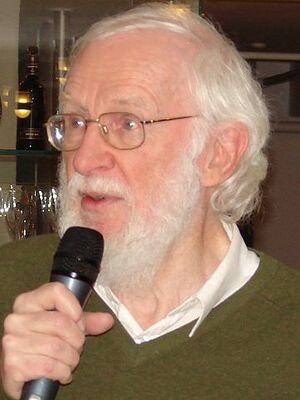Peter Naur (nonfiction)
Peter Naur (25 October 1928 – 3 January 2016)[1] was a Danish computer science pioneer and Turing award winner. His last name is the "N" in the BNF notation (Backus–Naur form), used in the description of the syntax for most programming languages. He contributed to the creation of the ALGOL 60 programming language.
His main areas of inquiry were design, structure and performance of computer programs and algorithms. Areas such as software engineering and software architecture have also been pioneered by Naur. In his book Computing: A Human Activity (1992), which is a collection of his contributions to computer science, he rejected the formalist school of programming that views programming as a branch of mathematics. He did not like being associated with the Backus–Naur form (attributed to him by Donald Knuth) and said that he would prefer it to be called the Backus normal form.
Naur was married to computer scientist Christiane Floyd.
Naur disliked the very term "computer science" and suggested it be called "datalogy" or "data science". The former term has been adopted in Denmark and in Sweden as datalogi, while the latter term is now used for data analysis (including statistics and databases).
In later years he was quite outspoken of the pursuit of science as a whole: Naur can possibly be identified with the empiricist school, that tells that one shall not seek deeper connections between things that manifest themselves in the world, but keep to the observable facts.
In the News
Fiction cross-reference
Nonfiction cross-reference
- Backus–Naur form (nonfiction) - a notation technique for context-free grammars, often used to describe the syntax of languages used in computing, such as computer programming languages, document formats, instruction sets and communication protocols. They are applied wherever exact descriptions of languages are needed: for instance, in official language specifications, in manuals, and in textbooks on programming language theory.
- Donald Knuth (nonfiction)
External links:
- Peter Naur @ Wikipedia
